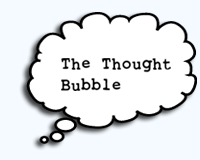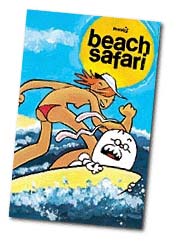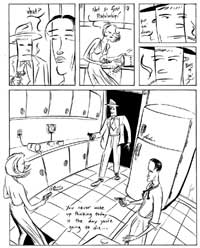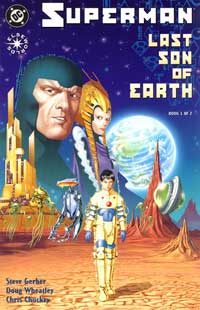- Comics
- Comics Reviews
- Manga
- Comics Reviews
- European Comics
- News
- Comics News
- Press Releases
- Columns
- Spotlight
- Digital Comics
- Webcomics
- Cult Favorite
- Back Issues
- Webcomics
- Movies
- Toys
- Store
- More
- About
By Philip Schweier
January 25, 2004 - 08:26
 Submissive Mail
Submissive Mail
 On November 12, 2003, The Savannah College of Art & Design’s Sequential Art department hosted its annual Editor’s Day. In attendance were Chris Starros, Editor-in-Chief & Publisher, Top Shelf; Joey Cavalieri, Editor, DC Comics; Axel Alonso of Marvel Comics; and Jamie Rich, Editor-in-Chief, Oni Press. During their visit to the college, they reviewed portfolios and offered real world advice to aspiring comics creators.
On November 12, 2003, The Savannah College of Art & Design’s Sequential Art department hosted its annual Editor’s Day. In attendance were Chris Starros, Editor-in-Chief & Publisher, Top Shelf; Joey Cavalieri, Editor, DC Comics; Axel Alonso of Marvel Comics; and Jamie Rich, Editor-in-Chief, Oni Press. During their visit to the college, they reviewed portfolios and offered real world advice to aspiring comics creators.
•••••••••••••••••••••
Once upon a time in the comics industry, an avid fan of any age could write a letter to his or her favorite comic book. “Dear Batman, I think you’re cool. Will you come to my birthday party?”
But as comics matured, so did the letters. College students were writing theses on the schizophrenic aspects of the dual identity and capitalism run rampant in the pages of Uncle Scrooge. The great thing was that if you wrote often enough, you might develop enough name recognition to get some story ideas in front of the right editor, and be on your way to becoming a professional comics writer.
DC and Marvel used to be this sort of farm system where they would break people in and slowly put them onto bigger and bigger books, but that system no longer works. With the advent of the direct market, the necessity for creator’s rights, and other evolutionary changes in the industry, comics are more expensive to produce, and companies look for more established writers and artists.
“We get one or two submissions a week now,” says Jamie Rich, editor in chief at Oni Press. “We said ‘Don’t send them,’ but I think we would get about 10-20 a week. I remember at Dark Horse when I was submissions editor I kept track for over a month, and I think we were averaging about 100 a week. That was in the mid ‘90s. Part of the reason we stopped doing it at Oni, beyond some legal stuff, is we just weren’t getting anybody.”
The legal issues spoken of stem from situations in which a submission is very similar to an idea already in development. This can lead to allegations of plagiarism. For instance, according to the Associated Press, Marcel Walker of Pittsburgh, a 31-year-old freelance graphic artist, filed a lawsuit against DC Comics claiming it published his Superman story three years after rejecting it. In his proposal, the familiar story of Superman’s origin is reversed: Superman is born on Earth and sent to Krypton before Earth’s expected demise. He grows up, performs heroic feats and learns his true identity. Ultimately, he returns to Earth. Those general themes were in “Superman: The Last Son of Earth,” released in the summer of 2000.
“It’s kind of weird,” says DC editor Joey Cavalieri, “Because Warner Brothers just decided that we don’t accept submissions any more but prior to that I would get 2 a day, 3 a day. But even after we said, ‘Please don’t send us anymore,’ we still get them.
“I should hasten to point out that the reason we don’t accept unsolicited material anymore,” he adds. “As it was explained to me, it is not out of mean-spiritedness or anything like that. The reasons were twofold; A: legal; B: they were afraid of anthrax.”
The quality of submissions runs the gamut, Cavalieri says. “From the incredibly publishable, to the inappropriate is the word I would use – It’s great stuff, we just don’t have a place for it – to the utterly hopeless.”
 “I had a guy send me a binder of six different intellectual properties” he added. “The law of averages says that one of those is similar to something that I’m working on.”
“I had a guy send me a binder of six different intellectual properties” he added. “The law of averages says that one of those is similar to something that I’m working on.”
“There’s no idea out there that is that unique,” claims Jamie Rich. “We will get five proposals in a row for a western. And we have no idea why so many people all of a sudden want to do a western, but we got the proposals. And we might already be working on that western, and they might both be about trains. There will be people who will stand up and say ‘I was the guy that came up with the idea to do a train.’ Or ‘I put vampires in a post-nuclear world.’ “
There are ways around the thorny legal issues. By self-publishing or publishing on the web, your copyright can be protected. An additional benefit of these formats is that it offers you even more material to put in front of potential publishers, suggesting you are working at promoting yourself and your idea, rather than just showing work to editors in an effort to get work.
Web submissions can be equally problematic. Due to limited bandwidth and time constraints, never email an editor a JPG. “Trust me,” says Chris Starros of Top Shelf Publications, “They will burn effigies of you in their offices because that can tie him up for an hour, just to suck down your crappy email.” The best thing to do is to send web address with a cover letter inviting the editor to come take a look. “If you have a website up, then he can choose to download your images, and if he wants to spend 30 minutes downloading them that’s fine,” he adds. “You don’t have that stigma that you burnt that bridge up front.”
Multiple submissions have what one might call “the shotgun effect,” in that you’re bound to hit your target, if only by the volume. It is suggested that a broader approach may be more suitable, especially for novice writers and artists. Perhaps by simply asking for feedback from an editor, he’ll do a critique for you.
“The truth is, the first story you put out there is going to suck,” says Starros. “The second story is going to suck a little less, and after about three or four of them you’re going to go ‘Why did I ever have the guts to put out that first one?’ Keep working on that first one forever to make it perfect is the wrong approach. You’ve got to stop polishing that turd, you’ve got to let it go, and then all of a sudden you’ve become a storyteller. Get it out there, get some feedback, make some friends, get networked, and all of a sudden you’ll find yourself with the publishers wanting to talk to you.”
“If you’re going to send somebody something that’s written, you need to make sure that there’s a synopsis for it, and that it is extremely well-written and captivating,” advises Starros. “You need a concise thing that’s really going to grab them and make them think ‘Well, that’s a clever idea, I’m going to read the first few pages of the script.’ If it doesn’t establish characters right away, if it’s not engaging, you’re going to lose them and that script is going to be down.”
Despite the likelihood of your material ending up in a pile with several other submissions, it does happen that sending your idea to a publisher can pay off, according to Starros. “We found, like with the Pistol Whip series and the Beach Safari, were the two books that we picked straight out of the PO box and it was like ‘WOW! Who are these people? Let’s talk to them, and sign them, and publish some work.’ I hear there’s even a movie deal in the works, so it does happen, and it is small.
“Pistol Whip was a completed book, and they actually distinguished themselves very much,” explains Starros. “They had actually gone out and xeroxed it on really nice paper that was already tinted and they had the books bound. When I opened the package I thought it was a comp, you know, just a copy from a publisher that was sending me a sample book to say, ‘Hey, guys, here’s what we’re up to.’ But there was a letter, so it was a submission, and not only that it had come with a set of cigarette trading cards that they had handmade, and it came with the Carnival cigarettes that were lit on the one end, and if you blew on them smoke came out. They had bagged them in little bags with their logo and masthead on it. They came with cut-out dolls of all the characters, and to distinguish the whole package it was in a giant cigar box. And when you opened it up, and read it, it was like ‘Okay, these guys are really on top of their game.’
 While using creativity to distinguish your material from others, it is something of a double-edged sword. “If I get a package like that, I’m slightly more suspicious,” says Jamie Rich. “I’m worried that maybe he spent way too much time on the package. That’s the down side, that’s the challenge. You got to make sure that you got enough faith in the work. I’ve seen a lot of great packages, but you open it up and it’s like a really bad book report.
While using creativity to distinguish your material from others, it is something of a double-edged sword. “If I get a package like that, I’m slightly more suspicious,” says Jamie Rich. “I’m worried that maybe he spent way too much time on the package. That’s the down side, that’s the challenge. You got to make sure that you got enough faith in the work. I’ve seen a lot of great packages, but you open it up and it’s like a really bad book report.
“I do think it’s negative in the industry, and this has been going on for a while, in that you see a lot of properties come through that want to be published that are either failed screenplays – people that are trying to get into comics that think they can sell their screenplays – or just created in general, like ‘We want to sell this to Hollywood.’ You can see those a mile away after a while, and don’t even get near them. For what we’re doing, it’s not worth it. If you’re not in it for the comic book to be the comic book, then there’s no point in us even bothering with the property at all.”
Such material falls into the category that Joey Cavalieri referred to as inappropriate. While the quality of the work may be very publishable, it sometime happens that it simply isn’t a good match for the publisher in question. It pays to do your homework, so you are familiar with the kind of books published by Oni Press or Top Shelf. Such research can be undeniably fun, because it simply amounts to reading the types of books more independent companies publish. •
Praise and adulation? Scorn and ridicule? Email me at philip@comicbookbin.com.
Past Articles by Philip Schweier